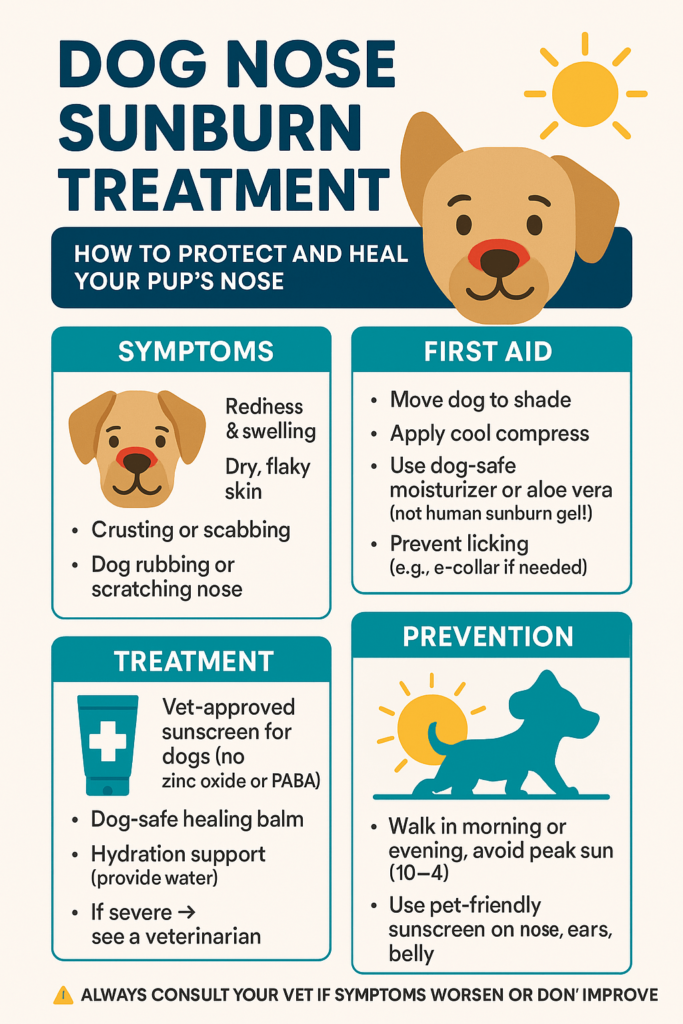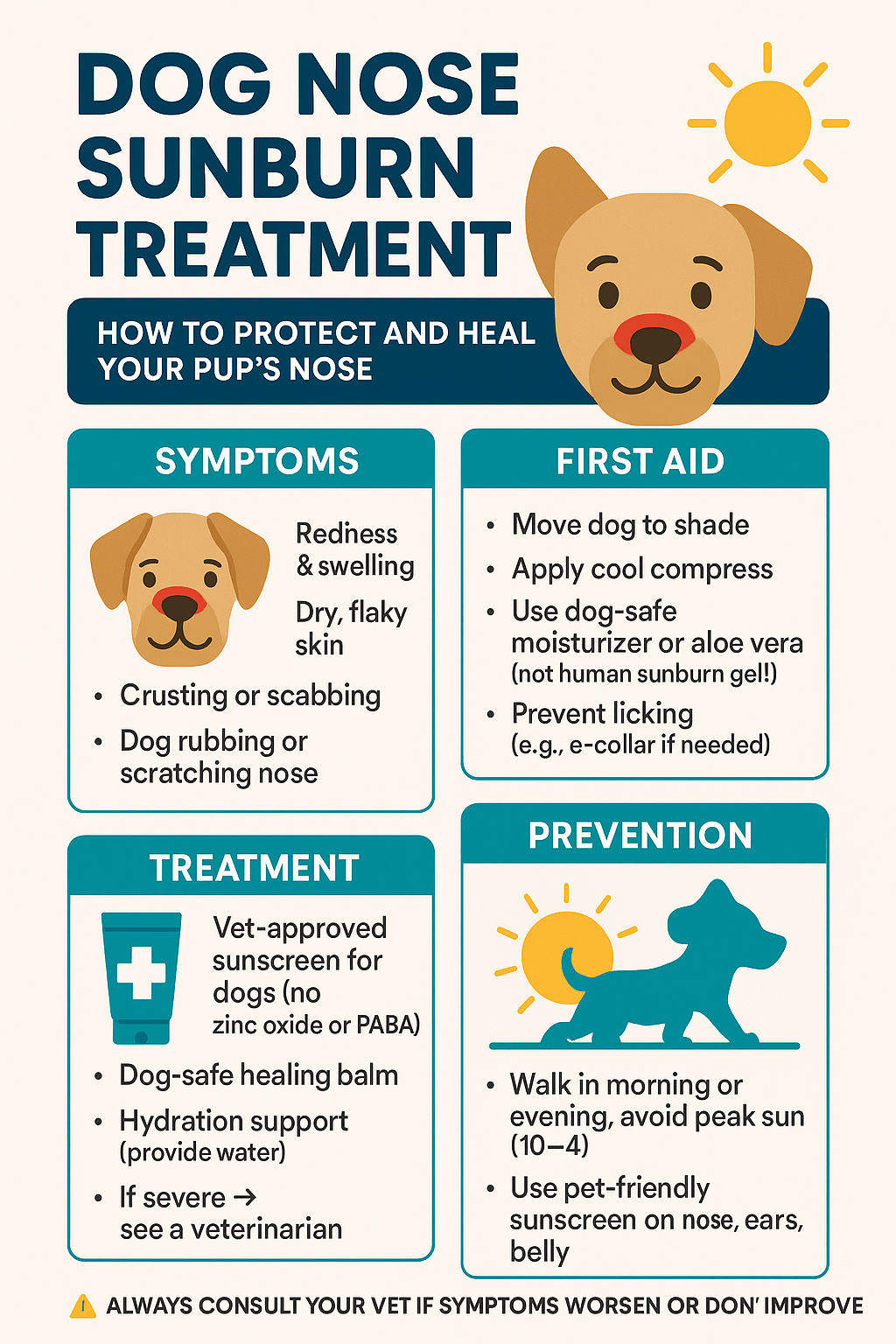Dog Nose Sunburn Treatment: How to Protect Your Pup’s Sniffer
A dog’s nose is one of their most sensitive and vital features, serving as a tool for exploration, communication, and comfort. However, just like human skin, a dog’s nose can fall victim to sunburn, especially during prolonged exposure to the sun. While many pet owners focus on protecting their dog’s coat or paws, the nose often gets overlooked—until it becomes red, dry, or irritated. Understanding how to treat and prevent dog nose sunburn is crucial for maintaining your furry friend’s health and happiness. In this guide, we’ll explore effective remedies, preventative measures, and expert tips to keep your dog’s nose healthy and sunburn-free.
Expert Insight: When to Seek Veterinary Care for Sunburn and Heat Exhaustion
“In cases of severe sunburn, it’s best to contact a veterinarian for treatment. It’s also important to watch for symptoms of heat exhaustion after your dog has been out in the sun. In addition to sunburn, these include weakness, fainting, excessive panting, vomiting, and uncoordinated movements and can be fatal. Heat exhaustion is more common than sunburn and skin lesions should be checked by a vet before you treat at home.”
Recognizing the Signs of Dog Nose Sunburn
Before diving into treatment options, it’s essential to recognize the signs of sunburn on your dog’s nose. Early detection ensures prompt care and prevents further damage.
Redness and Swelling:
A sunburned nose may appear redder than usual, accompanied by mild swelling or puffiness.Dryness or Cracking:
The skin on your dog’s nose may become dry, flaky, or even cracked due to sun exposure.Increased Sensitivity:
Your dog may show signs of discomfort when you touch their nose, such as flinching or whining.Peeling or Scabbing:
Severe sunburn can cause the skin on the nose to peel or develop scabs, indicating significant damage.Behavioral Changes:
Dogs with sunburned noses may paw at their face frequently or avoid outdoor activities altogether.
By staying vigilant and identifying these symptoms early, you can provide timely relief and prevent complications like infections or long-term damage.

How to Treat a Sunburned Dog Nose
Once you’ve identified that your dog has a sunburned nose, it’s time to take action. These steps will help soothe irritation and promote healing.
Cool the Area with a Damp Cloth:
Gently apply a cool, damp cloth to the affected area to reduce inflammation and provide immediate relief.Use a Pet-Safe Aloe Vera Gel:
Apply a small amount of aloe vera gel formulated for pets to moisturize and heal the damaged skin. Avoid products containing alcohol or artificial fragrances.Apply Coconut Oil:
Virgin coconut oil is a natural remedy that hydrates and repairs sunburned skin while being safe for dogs if licked.Keep Your Dog Indoors:
Limit outdoor time until the sunburn heals to prevent further irritation or worsening of the condition.Consult Your Veterinarian:
For severe cases, seek professional advice to rule out infections or other complications and receive tailored treatment recommendations.
With proper care and attention, your dog’s nose should heal within a few days, restoring its natural softness and functionality.
Check this guide 👉Dog Nose Turning White: Best 7 Expert Tips!
Check this guide 👉Dog Nose Fungus: Best 7 Expert Tips!
Check this guide 👉Dog Nose Dripping Clear: Best 7 Expert Tips!
Preventing Dog Nose Sunburn | Treating Dog Nose Sunburn |
|---|---|
Use pet-safe sunscreen | Cool the area with a damp cloth |
Limit outdoor time during peak sun | Apply pet-safe aloe vera gel |
Provide shaded areas outdoors | Use virgin coconut oil for hydration |
Use protective balms or wax | Keep your dog indoors while healing |
Monitor your dog’s behavior | Consult a vet for severe cases |
Best Practices for Preventing Dog Nose Sunburn
Prevention is always better than cure, especially when it comes to your dog’s delicate nose. Follow these practices to minimize the risk of sunburn.
Choose a Pet-Safe Sunscreen:
Opt for a sunscreen specifically designed for dogs, as human products may contain harmful ingredients like zinc oxide.Reapply Sunscreen Regularly:
If your dog spends extended periods outdoors, reapply sunscreen every few hours to maintain protection.Avoid Peak Sun Hours:
Schedule walks and outdoor playtime during early mornings or late afternoons when the sun’s rays are less intense.Provide Shade and Shelter:
Ensure your dog has access to shaded areas or indoor spaces during sunny days to reduce direct exposure.Invest in Protective Gear:
Consider using snout balms or protective wax coatings to shield your dog’s nose from UV rays.
By incorporating these habits into your routine, you can significantly reduce the likelihood of your dog experiencing a painful sunburn.
Common Mistakes to Avoid When Treating Dog Nose Sunburn
While treating a sunburned nose, certain mistakes can delay healing or worsen the condition. Being aware of these pitfalls ensures a smoother recovery process.
Using Human Sunscreen:
Many human sunscreens contain toxic ingredients like zinc oxide, which can be harmful if ingested by your dog.Applying Oily Products Without Research:
Not all oils are safe for dogs; some may irritate their skin or upset their stomach if licked.Ignoring Signs of Infection:
Red flags like pus, excessive swelling, or persistent discomfort warrant immediate veterinary attention.Exposing the Nose to More Sun:
Allowing your dog outside without protection can exacerbate the sunburn and prolong healing time.Skipping Hydration:
Failing to moisturize the nose regularly can lead to cracking and discomfort, hindering the healing process.
By avoiding these common errors, you can ensure your dog’s sunburn heals quickly and effectively.
Natural Remedies for Dog Nose Sunburn
If you prefer natural solutions, several remedies can help soothe and heal a sunburned dog nose. These options are gentle yet effective for minor cases.
Cucumber Slices:
Place chilled cucumber slices on your dog’s nose to reduce redness and inflammation naturally.Oatmeal Paste:
Mix ground oatmeal with water to create a paste, then apply it to the sunburned area for soothing relief.Chamomile Tea Compress:
Brew chamomile tea, let it cool, and use it as a compress to calm irritated skin.Shea Butter Balm:
Use unscented, natural shea butter to moisturize and protect the nose without causing irritation.Honey Application:
Raw honey has antibacterial properties and can aid in healing while being safe for dogs to lick.
Natural remedies offer a holistic approach to treating dog nose sunburn, promoting healing without harsh chemicals.
Breeds Most Prone to Sunburn
Certain dog breeds are more susceptible to sunburn due to their physical traits or lack of pigmentation. Understanding breed-specific risks helps tailor your prevention strategy.
Hairless Breeds (e.g., Chinese Crested):
Hairless dogs lack protective fur, making their entire body—including their nose—vulnerable to sunburn.Light-Colored Breeds (e.g., Dalmatians):
Dogs with white or light-colored fur often have less melanin, increasing their risk of UV damage.Short-Nosed Breeds (e.g., Bulldogs):
Brachycephalic breeds tend to have exposed noses, leaving them more prone to sun exposure.Pale or Pink Noses:
Dogs with lighter pigmentation on their noses absorb more UV rays, heightening their susceptibility to burns.Senior Dogs:
Older dogs may have thinner skin or reduced ability to heal, making them more vulnerable to sun damage.
Knowing which breeds are at higher risk allows you to take extra precautions to protect their sensitive noses.
Seasonal Considerations for Dog Nose Care
Seasonal changes bring unique challenges for dog nose care, requiring adjustments to your routine. Tailoring your approach ensures year-round protection.
Summer Months:
Focus on preventing sunburn by applying sunscreen and limiting outdoor time during peak sun hours.Winter Dryness:
Cold weather can dry out your dog’s nose; use hydrating balms to prevent cracking and chapping.Spring Allergies:
Pollen and allergens can irritate sensitive noses; clean your dog’s nose gently with a damp cloth.Autumn Winds:
Harsh winds can chap your dog’s nose; use protective waxes to shield against environmental elements.Year-Round Monitoring:
Regardless of the season, regularly check your dog’s nose for signs of irritation or damage.
Adapting your care routine to seasonal conditions keeps your dog’s nose healthy no matter the time of year.
Frequently Asked Questions About Dog Nose Sunburn
Can dogs get sunburned on their noses?
Yes, dogs can get sunburned on their noses, especially if they have light-colored fur or spend extended periods in the sun.
Is it safe to use coconut oil on my dog’s nose?
Yes, virgin coconut oil is safe for dogs and can help moisturize and heal sunburned skin.
How long does it take for a dog’s nose to heal from sunburn?
Mild sunburn typically heals within 3-5 days, while more severe cases may take up to two weeks.
What should I do if my dog licks the sunscreen off?
Use a pet-safe sunscreen and monitor your dog closely. If they ingest large amounts, contact your vet immediately.
Can I prevent sunburn by keeping my dog indoors?
While indoor time reduces risk, sunlight through windows can still cause burns. Use protective balms or sunscreen for added safety.
Prioritizing Your Dog’s Nose Health Year-Round
A sunburned nose is not only uncomfortable for your dog but also a reminder of the importance of proactive care. By recognizing the signs, treating sunburn promptly, and implementing preventative measures, you can safeguard your pup’s sniffer against harmful UV rays. Remember, consistency and attentiveness are key—whether it’s applying sunscreen, providing shade, or monitoring for symptoms. With these strategies in place, you can ensure your dog enjoys outdoor adventures safely while keeping their nose healthy and happy. After all, a happy nose means a happy dog!
How Cats Develop Lymphoma: Best 7 Expert Tips! – Learn about causes, symptoms, and prevention to protect your cat from this common cancer.
How Dogs Develop Lymphoma: Best 7 Expert Tips! – Learn causes, symptoms, and prevention strategies to protect your dog from this common cancer.
Diphenhydramine Safe for Dogs? Best 7 Expert Tips! – Learn proper dosing, uses, and precautions to keep your dog safe while using Benadryl.
Is Milk in Cat Food Safe? Best 7 Expert Tips! – Discover the truth about milk in cat food, its risks, and how to keep your feline healthy and happy.





